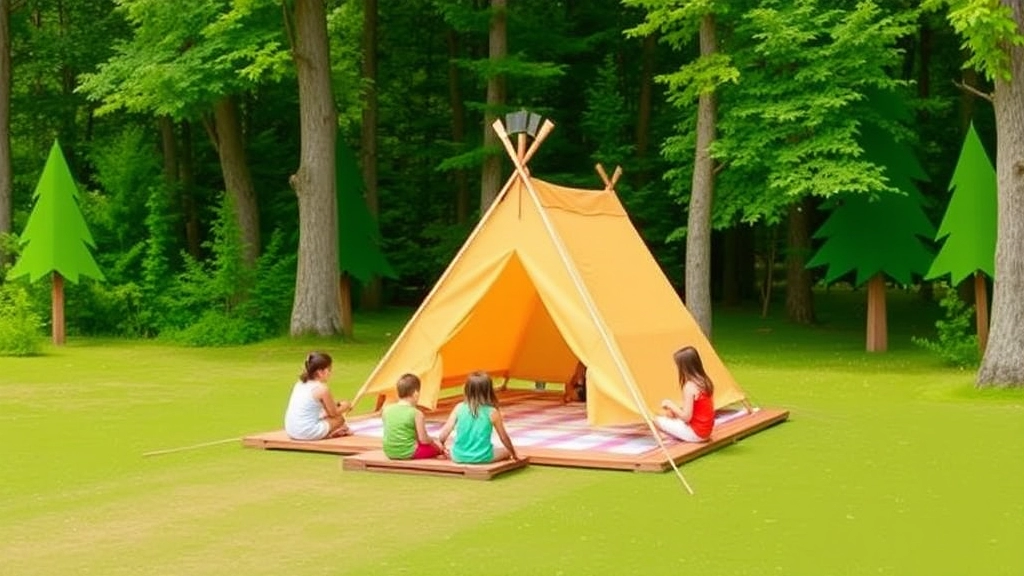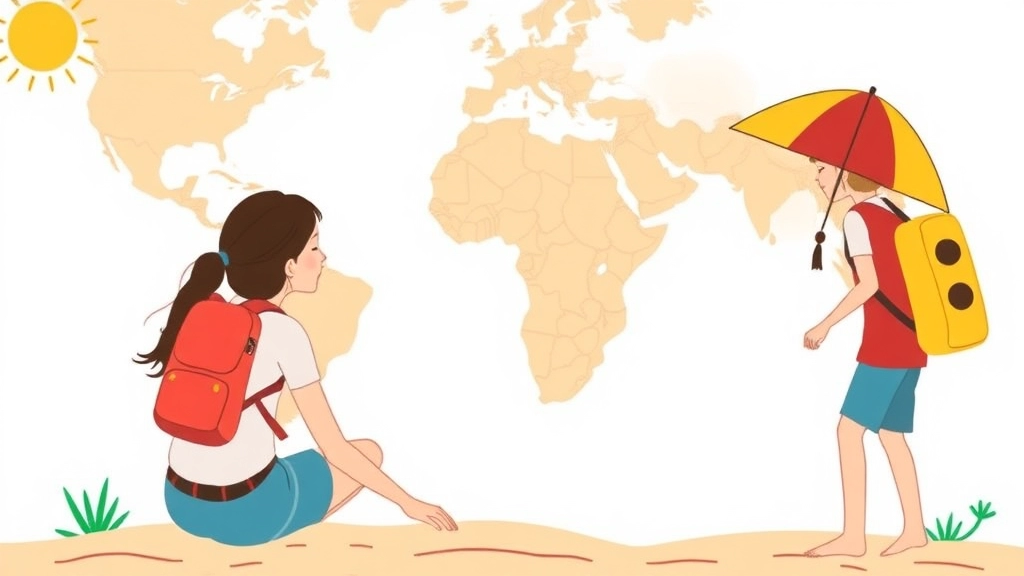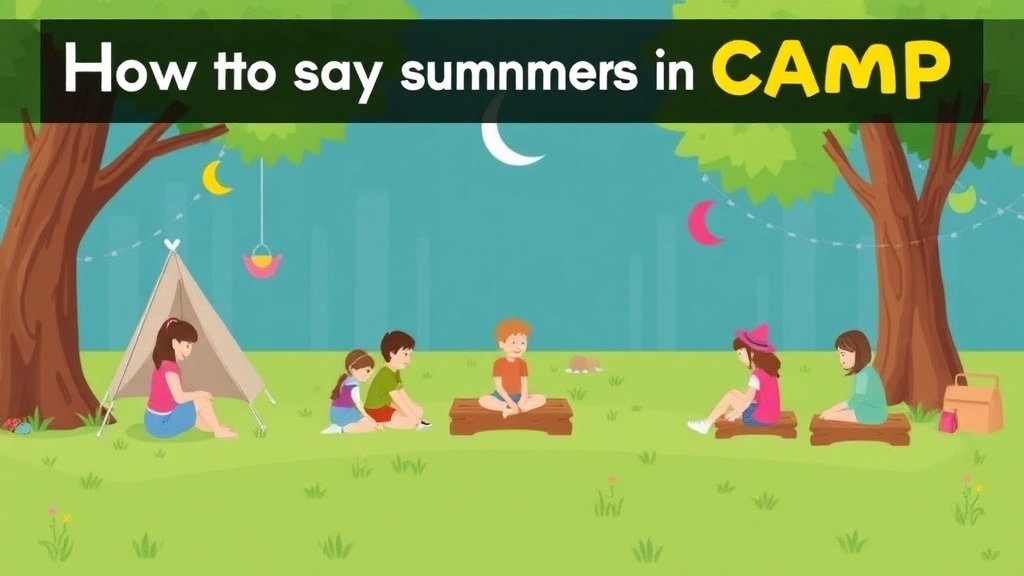Have you ever found yourself wondering how to say “summer camp” in Spanish? Whether you’re planning a trip, learning the language, or simply curious, understanding the right term can be incredibly useful. In this article, we will explore the common translations, regional variations, and cultural significance of summer camps in Spanish-speaking countries, making your conversations more authentic and engaging.
The term “campamento de verano” is the most straightforward translation for “summer camp” in Spanish, but there’s more to it than meets the eye. From regional differences to formal and informal expressions, and the cultural importance of these camps, we’ll cover everything you need to know. Plus, we’ll dive into related vocabulary, activities, and real-life usage examples to help you feel confident in any Spanish-speaking setting.
Common Translations of “Summer Camp” in Spanish
Ever wondered how to say “summer camp” in Spanish? It’s a question I get all the time. Whether you’re planning a trip, learning the language, or just curious, knowing the right term can be super handy. So, let’s dive into it.
The Basics: “Campamento de Verano”
The most straightforward translation for “summer camp” in Spanish is “campamento de verano.” It’s pretty much the go-to term across the board. Easy to remember, right?
But here’s the thing: Just like in English, there are a few variations you might come across depending on where you are or who you’re talking to. Let’s break it down.
If you’re interested in learning more about different types of camps, check out our guide to top autism spectrum summer camps. For those looking to stay cool during the summer, our tips on beating the heat while camping might be just what you need.
Regional Variations in the Term “Summer Camp”

Ever wondered how to say “summer camp” in Spanish? It’s not as straightforward as you might think.
Different regions have their own twists on the term.
So let’s break it down.
Common Terms for “Summer Camp”
In most Spanish-speaking countries, “campamento de verano” is the go-to term.
But, just like how we have “holiday” in the UK and “vacation” in the US, there are variations.
Spain vs. Latin America
In Spain, you’ll hear “campamento de verano” almost exclusively.
But cross the Atlantic, and things change a bit.
In Mexico, you might hear “campamento de verano” too, but sometimes just “campamento” is enough.
In Argentina, they might say “colonia de vacaciones”.
It’s like each country has its own flavour.
Why Does It Matter?
Imagine you’re chatting with a friend from Argentina and you use the term “campamento de verano”.
They might get it, but it’s not what they’d naturally say.
Knowing these differences can make your conversations smoother and more authentic.
Quick Reference Table
| Country | Common Term |
|---|---|
| Spain | Campamento de Verano |
| Mexico | Campamento |
| Argentina | Colonia de Vacaciones |
| Colombia | Campamento de Verano |
Real-Life Example
I remember chatting with a buddy from Argentina.
I mentioned “campamento de verano” and he paused.
Then he said, “Oh, you mean ‘colonia de vacaciones’?”
It was a lightbulb moment for me.
Usage Examples of “Campamento de Verano” in Everyday Spanish
Alright, let’s dive right into it. Ever wondered how to use “campamento de verano” in everyday chat? I’ve got you covered. Whether you’re planning a trip or just curious about how folks use this term, here are some real-life examples to get you started.
Casual Conversations
When you’re chatting with friends or family, you might hear:
- “Mis hijos están muy emocionados por el campamento de verano este año.”
Translation: “My kids are really excited about summer camp this year.” - “¿Vas a enviar a tus hijos al campamento de verano?”
Translation: “Are you going to send your kids to summer camp?”
These are the kinds of questions and statements you’ll hear in everyday life. Notice how natural it sounds? That’s the goal.
In Schools and Communities
Teachers and community leaders often talk about summer camps too. Here’s how they might bring it up:
- “El campamento de verano es una excelente oportunidad para que los niños aprendan y se diviertan.”
Translation: “Summer camp is an excellent opportunity for kids to learn and have fun.” - “Estamos organizando un campamento de verano para los jóvenes de la comunidad.”
Translation: “We are organizing a summer camp for the youth in the community.”
Promotional Material
You might come across promotional material for summer camps, like flyers or social media posts. They often sound something like this:
- “¡InscrÃbete ahora en nuestro campamento de verano y asegura tu lugar!”
Translation: “Sign up now for our summer camp and secure your spot!” - “Nuestro campamento de verano ofrece actividades como natación, senderismo y manualidades.”
Translation: “Our summer camp offers activities like swimming, hiking, and crafts.”
Personal Stories
Let’s make this real with a personal story. Imagine you’re catching up with a friend over coffee, and they say:
- “Cuando era niño, siempre esperaba con ansias el campamento de verano. Hice amigos para toda la vida allÃ.”
Translation: “When I was a kid, I always looked forward to summer camp. I made lifelong friends there.”
See how it adds a personal touch? Sharing experiences makes the term more relatable.
Practical Tips
Here are some quick tips to keep in mind when talking about “campamento de verano”:
- Context Matters: Whether you’re in a formal setting or just chatting, the context will shape how you use the term.
- Keep It Simple: Use straightforward sentences. No need to overcomplicate things.
- Be Conversational: Imagine you’re talking to a friend. It makes the conversation flow better.
For more information on how to make the most out of your summer camp experience, check out our Ultimate Guide on Summer Camps in Spanish. Additionally, if you’re interested in the broader cultural impact of summer camps, don’t miss our article on Exploring the Culture of Summer Camps Today.
Cultural Significance of Summer Camps in Spanish-Speaking Countries

Ever wondered if summer camps are a big deal in Spanish-speaking countries?
Spoiler alert: They are.
But, let’s dive deeper.
Why Do Summer Camps Matter?
In many Spanish-speaking countries, summer camps, or “campamentos de verano,” aren’t just about keeping kids busy.
They’re a cultural staple.
Here’s why:
- Community Building: Camps bring kids from different backgrounds together.
- Skill Development: From sports to arts, kids learn new skills.
- Independence: It’s a chance for kids to spread their wings away from home.
A Day in the Life of a Summer Camper
Imagine waking up in a cabin surrounded by nature.
You start the day with a hearty breakfast.
Then, it’s off to activities like hiking, swimming, or even learning traditional dances.
Lunch is a communal affair, fostering friendships.
Afternoons are for crafts, team games, and maybe a siesta.
Evenings? Campfires, stories, and songs.
Sounds fun, right?
Real Stories, Real Impact
I remember chatting with a friend from Mexico.
She told me about her first summer camp.
She was nervous at first.
But by the end, she had a bunch of new friends and a newfound confidence.
These camps aren’t just a pastime.
They’re life-changing experiences.
The Bigger Picture
Summer camps also play a role in preserving cultural traditions.
Kids might learn local crafts, folklore, or regional dances.
It’s a blend of fun and education.
Camps for All Ages
In Spanish-speaking countries, camps aren’t just for kids.
There are family camps, teen camps, and even camps for adults.
Each with its own set of activities and focus.
Formal vs. Informal Expressions for “Camp” in Spanish
Ever wondered how to say “camp” in Spanish, but not sure if you’re using the right term for the right situation? You’re not alone. Many of us struggle with this, especially when planning trips or talking about activities. Let’s break it down together.
Formal Expressions for “Camp” in Spanish
When you’re in a formal setting, like talking to officials or writing an essay, you want to use the right terms. Here are some formal expressions for “camp” in Spanish:
- Campamento: This is the go-to word for “camp.” It’s used in most contexts and is universally understood across Spanish-speaking countries.
- Colonia de vacaciones: This term is often used for summer camps, particularly for kids. It carries a slightly more formal tone.
- Centro de actividades: This translates to “activity center” and can be used when referring to camps that offer a range of activities, not just outdoor adventures.
Informal Expressions for “Camp” in Spanish
Now, let’s switch gears. You’re chatting with friends or planning a casual trip. What’s the lingo?
- Camping: Yes, it’s borrowed from English, but everyone gets it. It’s super casual and widely used.
- Acampada: This is another informal term, often used when talking about going camping in nature.
- Campito: This is a diminutive form, often used affectionately or when talking about small, informal camps.
When to Use Each Term
Knowing when to use formal or informal terms can save you from awkward moments. Here’s a quick guide:
- Talking to Authorities: Stick with “campamento” or “colonia de vacaciones.”
- Chatting with Friends: Feel free to use “camping” or “acampada.”
- Writing an Essay or Report: Go formal with “campamento” or “centro de actividades.”
Examples to Make It Clearer
Let’s make this real with some examples:
- Formal: “El campamento de verano ofrece una variedad de actividades educativas.”
- Informal: “Vamos a hacer una acampada este fin de semana.”
Why It Matters
Getting these terms right can make a big difference. Imagine planning a trip and confusing “campamento” with “camping.” You might end up in a totally different setting than you expected. For those interested in finding the best camps, check out our top summer camps in Nashville and Richmond summer camps guide.
Quick Tips
- Formal Settings: Use “campamento” or “colonia de vacaciones.”
- Informal Chats: Go with “camping” or “acampada.”
- Writing: Stick to formal terms unless the context is casual.
Related Vocabulary: Activities and Phrases Associated with Summer Camps
Ever wondered what Spanish words you need to know for summer camp? You’re in the right place.
Let’s dive into the essential vocabulary and phrases that’ll make you sound like a pro.
Essential Activities at Summer Camp
When it comes to summer camp, it’s all about the activities. Here are some must-know terms:
- Natación (Swimming): Whether you’re diving in or just floating around, this one’s a staple.
- Senderismo (Hiking): Perfect for those nature trails.
- Fogata (Campfire): Gather around for stories and s’mores.
- Manualidades (Crafts): Get creative with some hands-on fun.
- Deportes (Sports): From fútbol (soccer) to baloncesto (basketball), there’s something for everyone.
Common Phrases You’ll Hear
Communication is key, right? Here are some phrases you’ll definitely come across:
- “¿Dónde está el campamento?” (Where is the camp?): You gotta know where you’re headed.
- “¿A qué hora es la fogata?” (What time is the campfire?): You don’t want to miss out.
- “Necesito ayuda con mi tienda de campaña.” (I need help with my tent.): Because setting up can be tricky.
- “¿Puedo participar en el senderismo?” (Can I join the hike?): Always good to ask.
Packing List Must-Haves
Packing for camp can be a nightmare. Here’s a quick list to keep you on track:
- Ropa cómoda (Comfortable clothes): Think shorts and t-shirts.
- Botas de senderismo (Hiking boots): Essential for those trails.
- Repelente de insectos (Insect repellent): Trust me, you’ll need it.
- Protector solar (Sunscreen): The sun can be brutal.
Fun Stories and Examples
Picture this: You’re at a Spanish summer camp, and you hear someone shout, “¡Vamos a la piscina!” (Let’s go to the pool!). You grab your traje de baño (swimsuit) and rush over, only to find out you forgot your toalla (towel). Classic rookie mistake, right?
Or maybe you’re sitting around the fogata, and someone hands you a stick with a marshmallow, saying, “¡Haz un s’more!” (Make a s’more!). You fumble a bit but finally get it right, and it tastes amazing.
FAQs on How to Say Summer Camp in Spanish
What is the most common term for “summer camp” in Spanish?
The most common term for “summer camp” in Spanish is “campamento de verano.”
Are there regional variations for “summer camp” in Spanish-speaking countries?
Yes, different regions have their own variations. For example, in Spain, the term “campamento de verano” is widely used, while in Argentina, you might hear “colonia de vacaciones.”
What term is used in Mexico for “summer camp”?
In Mexico, both “campamento de verano” and simply “campamento” are commonly used.
Why is it important to know the regional variations of “summer camp” in Spanish?
Knowing these differences can make your conversations smoother and more authentic, especially when talking to people from different Spanish-speaking countries.
Do summer camps have cultural significance in Spanish-speaking countries?
Yes, summer camps, or “campamentos de verano,” are a cultural staple in many Spanish-speaking countries. They play a significant role in community building, skill development, and fostering independence among kids.
What activities are typically included in a Spanish-speaking summer camp?
Activities often include hiking, swimming, traditional dances, crafts, team games, and communal meals. Evenings might feature campfires, stories, and songs.
Are there summer camps for different age groups in Spanish-speaking countries?
Yes, there are camps for all ages, including family camps, teen camps, and even camps for adults, each with its own set of activities and focus.
Can you give an example of a real-life situation where knowing the correct term for “summer camp” matters?
Imagine you’re chatting with a friend from Argentina and you use the term “campamento de verano.” They might understand, but it’s not what they’d naturally say. Knowing the term “colonia de vacaciones” would make the conversation more natural and relatable.
References
-
Summer Camp in Spanish: How to Say It and Where to Go
-
Summer Camps in Spain: A Cultural Experience
-
Summer Camps in Latin America: Volunteer Opportunities

